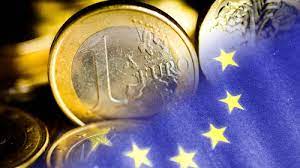
A survey released on Thursday revealed that the euro zone's economy was in recession as the contraction in business activity persisted at the end of 2023, primarily due to a sustained downturn in the bloc's leading services industry.
After a preliminary estimate of 47.0, HCOB's Composite Purchasing Managers' Index (PMI), which is compiled by S&P Global and is thought to be a good indicator of overall economic health, was revised up for December to match November's 47.6. However, it continued to fall short of the 50-point threshold that separates growth from contraction for a seventh month.
This suggested that the 20-nation currency union, which shrank by 0.1% in 2023's third quarter, most certainly shrank by 0.1% last quarter, satisfying the criteria for a recession under technical definitions.
From November's 48.7 to a five-month high of 48.8, the services PMI barely increased.
"It's not quite recession territory yet for services, but the vibe is far from growth-oriented. There are a lack of clear signals indicating an imminent return to robust expansion," said Cyrus de la Rubia, chief economist at Hamburg Commercial Bank.
"The Composite PMI...is sounding the recession alarm for the euro zone though," he added saying his economic modelling forecast a contraction in the fourth quarter.
The new business index rose to a five-month high of 47.1 from 46.7 last month, indicating that the decline in service demand slowed somewhat, but it stayed below 50 for a sixth month.
That was in line with the results of a related poll released on Tuesday, which revealed that factory activity in the euro zone shrank in December for the eighteenth consecutive month, capping up a dismal 2023.
Composite production prices rose at their fastest rate since June despite indications of a persistent downturn in demand, indicating that inflation will stay over the 2% target set by the European Central Bank in the near future.
"In the face of a stagnant services sector, it's impressive that service providers are successfully transferring a portion of their growing input costs to customers," added de la Rubia.
"This will go against those members of the European Central Bank who are inclined to cut rates already in March. We expect a first rate cut in June."
All in all, nevertheless, optimism for the coming year increased. The composite future output index increased from 56.0 to 57.6, a seven-month high.
(Source:www.newswav.com)
After a preliminary estimate of 47.0, HCOB's Composite Purchasing Managers' Index (PMI), which is compiled by S&P Global and is thought to be a good indicator of overall economic health, was revised up for December to match November's 47.6. However, it continued to fall short of the 50-point threshold that separates growth from contraction for a seventh month.
This suggested that the 20-nation currency union, which shrank by 0.1% in 2023's third quarter, most certainly shrank by 0.1% last quarter, satisfying the criteria for a recession under technical definitions.
From November's 48.7 to a five-month high of 48.8, the services PMI barely increased.
"It's not quite recession territory yet for services, but the vibe is far from growth-oriented. There are a lack of clear signals indicating an imminent return to robust expansion," said Cyrus de la Rubia, chief economist at Hamburg Commercial Bank.
"The Composite PMI...is sounding the recession alarm for the euro zone though," he added saying his economic modelling forecast a contraction in the fourth quarter.
The new business index rose to a five-month high of 47.1 from 46.7 last month, indicating that the decline in service demand slowed somewhat, but it stayed below 50 for a sixth month.
That was in line with the results of a related poll released on Tuesday, which revealed that factory activity in the euro zone shrank in December for the eighteenth consecutive month, capping up a dismal 2023.
Composite production prices rose at their fastest rate since June despite indications of a persistent downturn in demand, indicating that inflation will stay over the 2% target set by the European Central Bank in the near future.
"In the face of a stagnant services sector, it's impressive that service providers are successfully transferring a portion of their growing input costs to customers," added de la Rubia.
"This will go against those members of the European Central Bank who are inclined to cut rates already in March. We expect a first rate cut in June."
All in all, nevertheless, optimism for the coming year increased. The composite future output index increased from 56.0 to 57.6, a seven-month high.
(Source:www.newswav.com)





